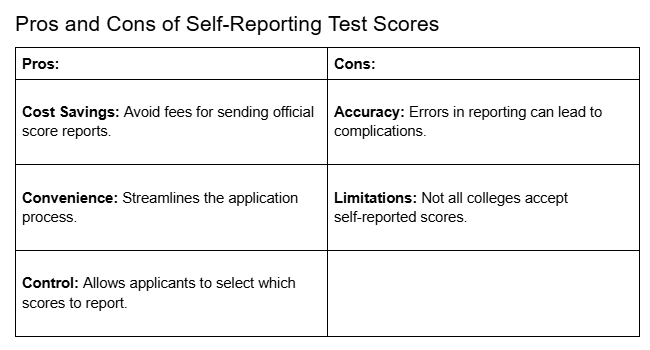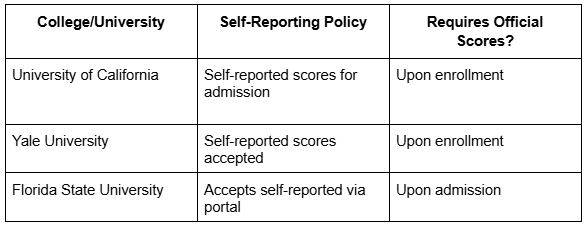The Ultimate Guide to Self-Reporting SAT® and ACT® Scores
Originally published as “Why Self-Reporting Test Scores Make for a Hassle-Free College Application Process” on July 13, 2022
Updated on December 30, 2024
Navigating the college application process can be overwhelming, but self-reporting test scores offers a streamlined approach. Many colleges and universities allow applicants to self-report their SAT® and ACT® scores, making the process more affordable and less stressful.
Here, we’ll cover everything you need to know about self-reporting test scores, including how it works, its advantages, and key considerations to share with your college-bound clients.
What Is Self-Reporting?
Self-reporting allows students to submit their standardized test scores directly through application platforms such as the Common Application or Coalition Application or through college-specific portals without paying fees to testing agencies. Official score reports are only required if a student is admitted and chooses to enroll, saving applicants time and money during the application process.
How to Self-Report Test Scores: 3 Methods
Method 1: Through the Common App
Navigate to the “Testing” section.
Enter SAT® or ACT® scores manually.
Double-check for accuracy before submission.
Want to learn more about the Common App? Click here!
Method 2: Through the Coalition App
Add test scores in the “Score Report” section.
Ensure test scores align with the testing dates.
Need more info on the Coalition App? Click here!
Method 3: Directly Through College Portals
Log in to the school-specific application portal.
Locate the “Self-Reported Scores” section.
Input test scores and save the information.
Colleges That Accept Self-Reported Test Scores
Many institutions, including highly selective colleges, accept self-reported test scores. Here’s a sample list:
Advise your students to check the college admissions websites of their chosen school(s) to find out if self-reporting is an option for their application.
Key Considerations for Your Clients:
Double-Check Accuracy: Remind your students of the importance of being honest and accurate when self-reporting their scores. Colleges may rescind offers if self-reported scores don’t match official reports.
Know the Policies: Applicants must research individual colleges to confirm they accept self-reported scores and understand their specific requirements before self-reporting their scores.
For example, these three schools have varying self-reporting policies:
Consider Superscoring: Some colleges accept superscores, which combine the best section scores across multiple test dates. Advise your clients to Include these details if applicable.
3 Steps to Successful Self-Reporting
Step 1: Organize Your Scores. Create a spreadsheet to track all your test dates, scores, and associated registration details. Clearly label each test, ensuring you have accurate records to refer to when entering scores on application platforms. This organization minimizes errors and ensures you don’t overlook key details during the application process.
Step 2: Follow the Instructions. Review each college’s self-reporting requirements thoroughly. Some colleges may only accept scores from specific test dates, while others require additional details, like subscores or test center codes. By carefully adhering to these instructions, you’ll avoid mistakes that could delay or complicate your application.
Step 3: Practice Transparency. Report your scores honestly and without embellishment. Colleges cross-reference self-reported scores with official reports upon enrollment. Any discrepancies can jeopardize your admission offer. If there’s an error, address it proactively by contacting the admissions office to rectify it.
Self-reporting standardized test scores can simplify the college application process by saving time and money. By helping your clients understand the process and keeping these tips in mind, your students can make the most of this option.
Encourage them to stay organized, follow all instructions carefully, and be honest about their scores. With proper guidance, self-reporting can reduce application stress and help students present their achievements confidently to colleges.
Offering clear advice on self-reporting test scores is an invaluable way to support your students during this critical stage in the college application process.
For more strategies and a full array of practice ACT® & SAT® Reading passages and questions, schedule a free demo of our 100% white-label test-prep platform. See how Clear Choice Prep’s software, custom-branded workbooks, and personalized curricular tools can help your students walk into test day ready for success.



